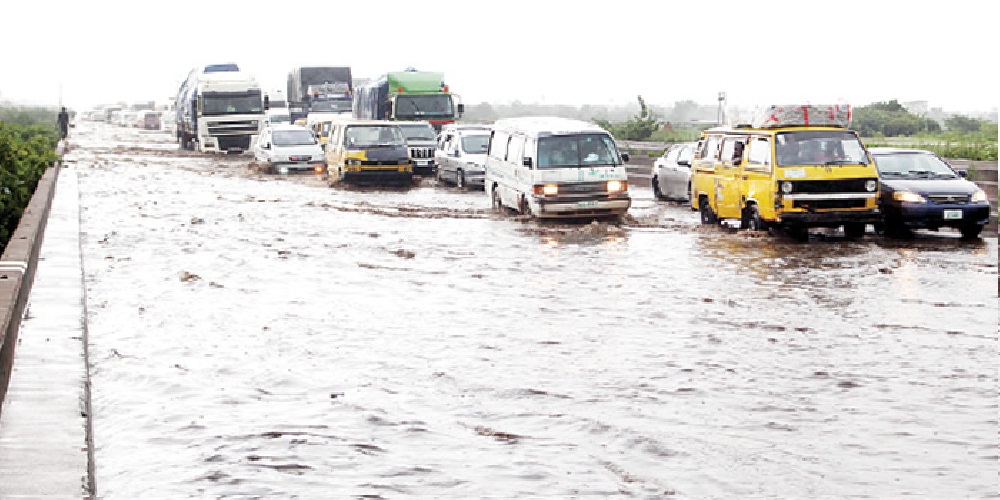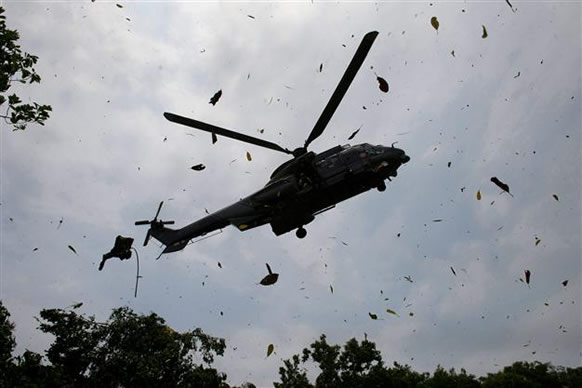News
Speaker Abbas Reiterates Commitment of FG In Regulating Wildlife, Conservation

News
World Polio Day: 138 Polio Cases In Africa, Nearly Half Infected Children From Nigeria – UNICEF

News
Confusion As Flood Unearths Corpses From Graves

Residents of Udaba, a community in Edo State, are grappling with the devastating aftermath of severe flooding that has uprooted graves, washing corpses out of their resting places.
The flood, which has wreaked havoc across multiple communities, has left many in fear and distress.
The impact is not limited to Udaba; other communities, including Anegbete, Ekperi, Osomhegbe, Ogoimeri, Iyowa, Ofukpu, Ifekhu, Agenebode, Ubiaja, and Ilushi, all within Etsako East, Etsako Central, and Esan South East local government areas, are also severely affected, PM News reports.
Joseph Odemokpai, the Councillor representing Ward 8 in Etsako Central Local Government Area, confirmed the extent of the crisis.
“In Udaba, some dead bodies have been washed away from the grave by the flood,” he said, stating the distressing reality faced by locals.
In addition to the alarming displacement of corpses, the severe cold brought on by the flooding has claimed several lives.
“Some persons have even died as a result of the severe cold due to the flood,” Odemokpai reported, emphasised the compounding dangers of the natural disaster.
According to Odemokpai, “Houses, farmlands, and crops—such as cassava, rice, and yam—have been submerged, with farm produce, livestock, and personal property swept away by the devastating flood.”
He said the flood situation remains critical, with water levels still high in the affected communities.
“Entire areas are overwhelmed by floodwaters, and efforts are underway to relocate residents to safety camps.
“Similar flooding has been reported in Ward 9 and Ward 10, affecting communities including Anegbete, Udochi, Ogomere, and Ifekhu, as well as Ofukpo, among others across the impacted local government areas.”
Odemokpai added that while the local government councils are currently taking action, he urged the National Emergency Management Agency (NEMA) and the Edo State Emergency Management Agency (EdoSEMA) to assist these communities.
News
More Bodies Recovered From Port Harcourt Helicopter Crash

The Nigerian Safety Investigation Bureau (NSIB) says two more bodies have been recovered from the Sikorsky S-76 helicopter that crashed in Port Harcourt, the Rivers State capital.
Three persons were confirmed dead following the crash on Thursday. Eight persons (six passengers and two crew members) were on board the aircraft when the incident happened.
Barely a day after the crash, the NSIB said more bodies have been recovered while three more persons remain unaccounted for.
“We have recovered two more bodies, making it a total of five. There are three more down there that hopefully will be recovered today,” NSIB Director General Alex Badeh said on Friday’s edition of Channels Television’s breakfast show Sunrise Daily.
When asked if there are chances that none of those on board the aircraft survived the crash, Badeh said, “Unfortunately. this time, that is the working theory”.
According to him, investigators are on their way to the scene of the accident, saying it would take days for the wreckage of the aircraft to be recovered.
‘We Might Find Survivors’
He said, “The priority is to recover the rest of the bodies there” but there is a “chance” that some persons onboard the aircraft might be alive.
“Human beings are resilient. As long as they have their life support devices, there is a chance we might find survivors there,” Badeh said.
The helicopter, with registration 5N-BQG, operated by Eastwind Aviation, crashed one kilometre away from its destination. It was engaged by the Nigerian National Petroleum Company Limited (NNPCL).
It crashed around 11:22 am along the waterways in the Rivers State capital after taking off from the Port Harcourt Military Base (DNPM) to the FPSO – NUIMS ANTAN oil rig.
The cause of the incident is unclear as of now but Badeh said “there was so light and moderate rain on their arrival and there was an overcast. We would look into that. That might have a chance or a role to play.
“Other than that, I can’t really say until we recover the flight recorder and speak to more witnesses there.”
Police authorities in Rivers State said all eight persons aboard the aircraft may have died from the incident.
“All eight persons onboard are feared dead,” the Rivers State Police Command said on Friday.
“The Marine Division of the Rivers State Police Command is cooperating with other agencies to recover the aircraft and the occupants.”
Following the crash, President Bola Tinubu ordered authorities to intensify their efforts in the rescue mission.
He also commiserated with the families of the victims and the NNPCL over the crash.
-

 News19 hours ago
News19 hours agoYou Should Be Sanctioned For Perjury’, PTD Chides NUPENG President
-

 News19 hours ago
News19 hours agoReps Give Five-day Ultimatum To Perm Sec, Works Ministry Over N1.46bn Abandoned Road Project
-

 News17 hours ago
News17 hours agoForeign object hits VP Shettima’s Plane in US, aborts Commonwealth trip
-

 News20 hours ago
News20 hours agoCaycee Mboya, tallest woman in Kenya, wants to be a second wife
-

 News24 hours ago
News24 hours agoJust in: Three confirmed dead as helicopter crashes into river in Port Harcourt
-

 News23 hours ago
News23 hours agoAngry GoTV subscribers demand refund after channel shutdown
-

 Metro6 hours ago
Metro6 hours agoJust in : Military Announces Arrest of IPOB’s Founding Father
-

 News3 hours ago
News3 hours agoFinally Obasanjo Opens Up On Third Term Ambition, Exposes Actual Sponsors








